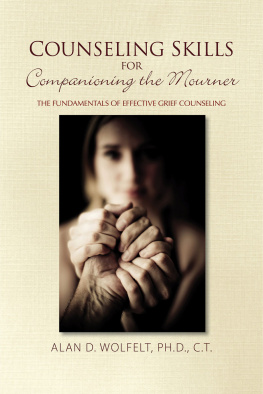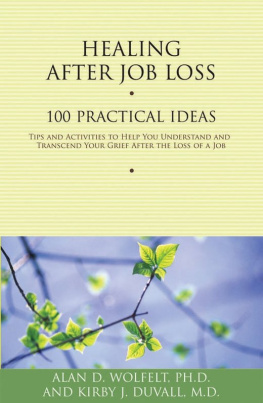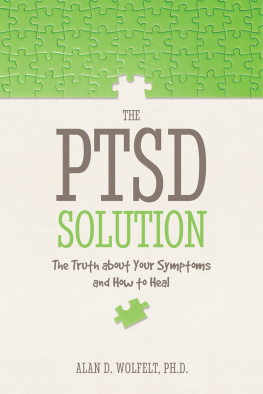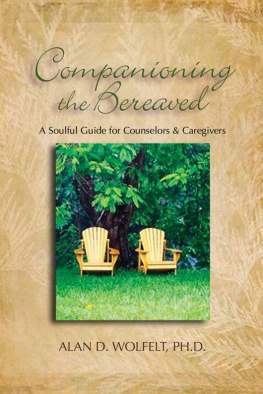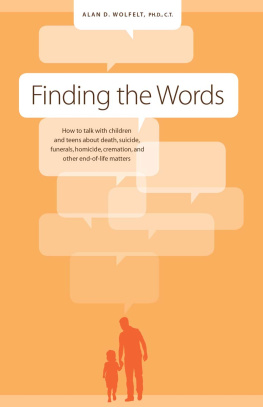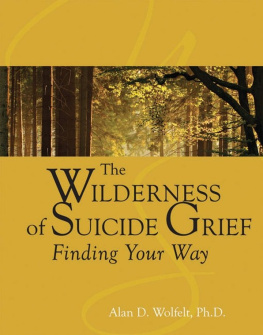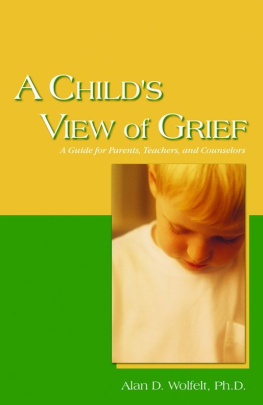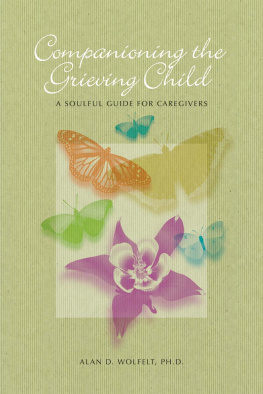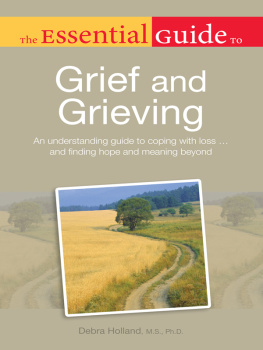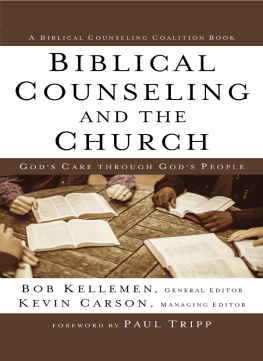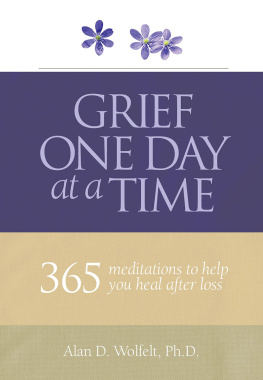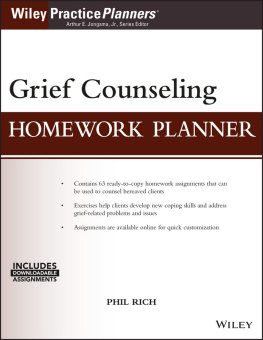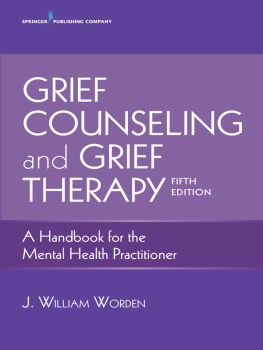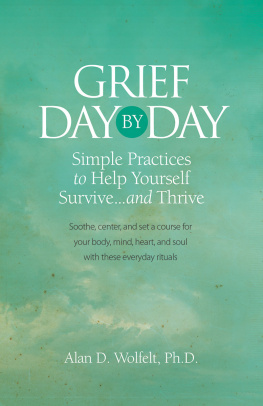ALSO BY ALAN D. WOLFELT, PH.D., C.T.
Companioning the Bereaved: A Soulful Guide for Caregivers
Companioning the Grieving Child: A Soulful Guide for Caregivers
Loving from the Outside In, Mourning from the Inside Out
The Handbook for Companioning the Mourner:
Eleven Essential Principles
The Paradoxes of Mourning:
Healing Your Grief with Three Forgotten Truths
Understanding Your Grief:
Ten Essential Touchstones for Finding Hope and Healing Your Heart

Companion Press is dedicated to the education and support of both the bereaved and bereavement caregivers. We believe that those who companion the bereaved by walking with them as they journey in grief have a wondrous opportunity: to help others embrace and grow through griefand to lead fuller, more deeply-lived lives themselves because of this important ministry.
For a complete catalog and ordering information, write, call, or visit:
Companion Press
The Center for Loss and Life Transition
3735 Broken Bow Road | Fort Collins, CO 80526
(970) 226-6050 | www.centerforloss.com

2016 by Alan D. Wolfelt, Ph.D.
All rights reserved. No part of this publication may be reproduced, stored in a retrieval system, or transmitted in any form or by any means, electronic, mechanical, photocopying, recording or otherwise, without the prior permission of the publisher.
Companion Press is an imprint of the Center for Loss and Life Transition, 3735 Broken Bow Road, Fort Collins, Colorado 80526.
24 23 22 21 20 19 18 17 16 5 4 3 2 1
ISBN: 978-1-61722-230-6
To the children, teens, adults, and families who have allowed me the honor of providing them a safe place to mourn well, so they can live well and love well.
CONTENTS
PART ONE:
THE STARTING POINT
PART TWO:
THE PATH
PART THREE:
THE SUMMIT
INTRODUCTION
I REMIND MYSELF FREQUENTLY THAT BEREAVEMENT LITERALLY MEANS TO BE TORN APART AND TO HAVE SPECIAL NEEDS. When a fellow human beings life has been torn apart by the death of someone loved, she deserves to be surrounded by caring, compassionate people who are good grief companions.
To comfort me, you have to come close. Come sit with me on my mourning bench.
NICHOLAS WOLTERSTOFF, LAMENT FOR A SON
The impetus for this book came from the observation that many people surrounding mourners are knowledgeable about grief and the need to mourn but often lack the helping skills to, well, help. To artfully companion people experiencing profound loss requires high levels of interpersonal counseling skills.
My hope is that the contents of this resource will be of value to both the student just starting out in grief care as well as the experienced counselor. Because it covers both philosophical underpinnings and the how-tos of fundamental skills, it will be useful to people continuing on for professional training in grief counseling and to people in paraprofessional or peer support settings, as well as to those who find themselves in informal helping relationships in their day-to-day lives.
For the grief support beginner, this resource is intended to provide a solid foundation in essential helping skills. For the experienced grief counselor, this resource will assist in articulating philosophies of grief care, reviewing and possibly honing current skills, adding new skills, and enhancing continued growth as a caregiver.
As someone who has a passion for training grief support persons and counselors, I work from the conviction that all interpersonal relationships are either helpful (growth-enhancing), neutral (neither helpful nor harmful), or harmful (destructive). I also believe that skills in responding supportively to people experiencing grief and the need to mourn are not innate but learned through modeling and focused practice. This book provides principles, practical skills, and activities whose aim is to enhance your capacity to facilitate (to make easer) the hard work of mourning. I also include an introductory overview of my philosophical approach of companioning versus treating mourners. In essence, the contents of this primer are directed at people in grief care, with the goal of adding to their toolbox of helping skills and inspiring them to be truly helpful caregivers.
I do ask you to keep in mind that grief counseling is a vast subject. There is no shortcut to becoming an effective grief-care provider. While this training resource will help you learn counseling skills related to your interest in providing grief support, my intent is not, nor should it be, to make you a grief therapist. I encourage those of you interested in becoming professional counselors to find a training program that meets your needs and career aspirations and meets the requirements of the state in which you live.
While you may read this book and work on the skills it reviews on your own, your concurrent participation in a workshop or classroom setting with an experienced trainer is strongly recommended. For example, I myself have taught for many years a four-day training entitled Counseling Skills Fundamentals, for which this book will soon serve as the companion text. The opportunity to participate with others and to share experiences has proved to be invaluable for caregivers who want to enhance their grief counseling skills. Increased understanding typically comes from discussions, modeling, and group experiences, rather than simply reading the text. We would love for you to come join us for our annual training on this topic!
Enjoy, and I hope we meet one day.

Alan D. Wolfelt, Ph.D., C.T.
September 2015
PART ONE:
THE STARTING POINT
WHERE DOES EFFECTIVE GRIEF CARE START? IT STARTS WITH YOU, THE CAREGIVER.
It starts with what you believe about grief and mourning.
It starts with your training and understanding of the helping relationship.
What I can do is offer myself, wholehearted and present, to walk through the fear and the mess. Thats all any of us can do. Thats what were here for.
SHAUNA NIEQUIST
It starts with your innate personality.
It starts with your personal experiences with loss and grief.
It starts with how all of this translates into your ways of being when you are in the company of someone who is grieving.
Whenever you enter into a counseling relationship, you are about to embark on a journey through the wilderness of grief with a fellow human being. You might think of the starting point as the trailhead. Before you set off, I urge you to make sure you are as prepared as possible. The wilderness is vast and inhospitable, and the journey is grueling. The mourner is trusting in you to help him survive.
Yes, lives are at stakeusually not literal life-or-death consequences but instead what I consider the even more important life of the soul.
On the journey to come, you will not be the guide, exactly, because (if you agree with me about my companioning philosophy of grief care, which well soon talk more about) you will be walking alongside the mourner, not in front of or behind him. As you walk, you will be allowing the mourner to choose the path. After all, this is really his journeynot yours.
Next page
